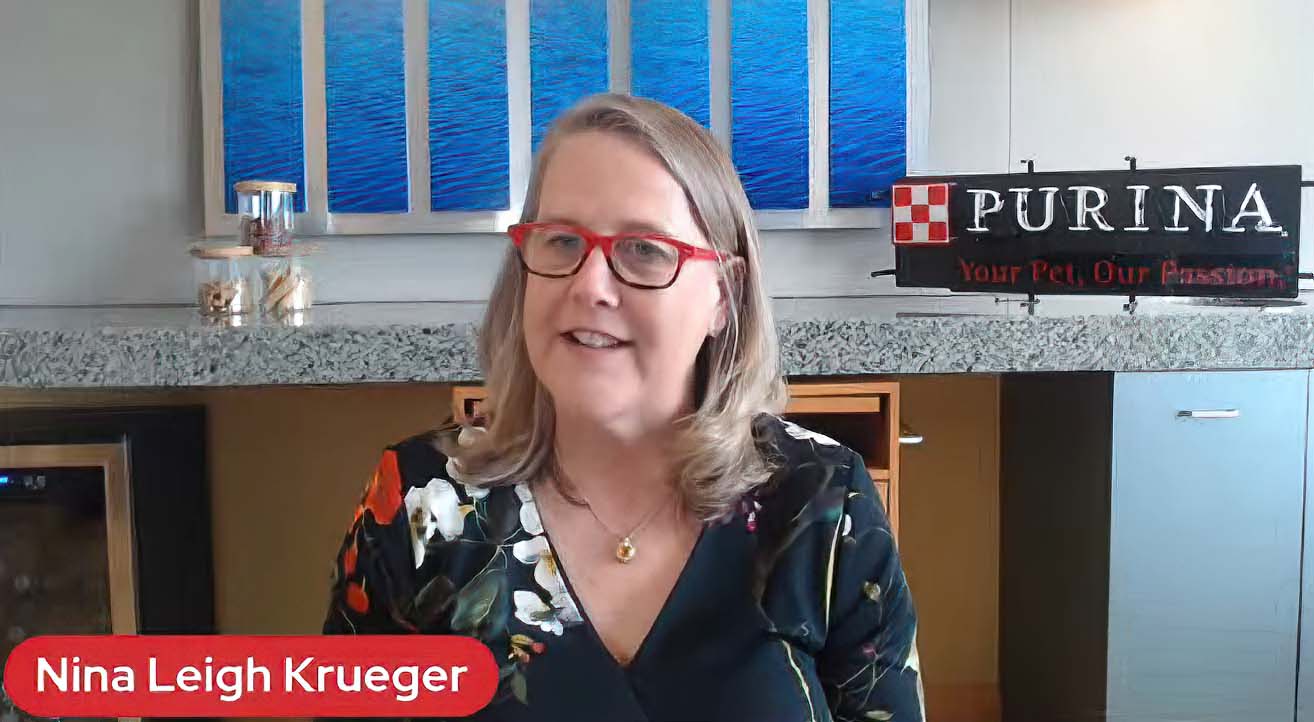Purina PetCare CEO: 'You don't have to lead all the time to be the leader'


Nina Leigh Krueger says that for a long time, she envisioned her career path as a ladder to be climbed. “That was always the visual that they gave you, and you would go up the rungs of the ladder. I would challenge people to think of it differently today. I would envision your career like a rock climbing wall, not a ladder. So when you climb a rock, you go up, you go sideways. Sometimes you go down and then you go up again,” she explained. “I think that's just so important for people to understand and students to understand is that the journey is going to take you in a lot of different places, and sometimes that lateral move is going to teach you skills that you never thought that you needed, but you absolutely do need to succeed.”
The Nestlé Purina PetCare CEO told students in her Executive Speaker Series discussion that she learned this lesson personally a few years ago. “I was at a point in my career where I needed to make a decision. Did I want to continue to go in marketing track, or did I want to go into more general business?’” Krueger recalled. “My mentor at the time said, ‘Hey, take that lateral move. It's going to work for you. You're going to learn those skills that you need, and then you'll see yourself propel up in the organization.’ And that's exactly what happened.”
Krueger is a 1983 marketing graduate who came to Miami after she was recruited by the university’s tennis coach. “From the moment I walked onto the campus, met the team, met some of the professors, I absolutely loved it. And the rest was history. I didn't look anywhere else. I just applied there,” she said. “It was such a wonderful experience.”
Starting as a brand management intern while getting her MBA in 1993, Krueger worked for Nestlé Purina in more than a half-dozen roles before becoming CEO and President in January. “The thing I enjoy most is really the subject matter. I love pets. So I have the ability to work in an area where I have a passion,” she explained. “The culture at Purina is absolutely incredible. The environment is so collaborative and not competitive. It's a family.”
Krueger talked about the challenges that Purina has faced during the coronavirus pandemic. “There was such a frenzy to stock up on foods and supplies that had a huge impact. If you stand in front of a shelf and you picture a bag of dog food, and you say, ‘OK, there's eight ingredients in that dog food and a package. The eight ingredients come from totally different places. The package comes from a different place. They all have to come on different forms of transportation and every single one of those elements was impacted during COVID. So how do you orchestrate all of that coming together to get that product on the shelf?’” she noted. “For us, that journey really starts with each of our associates at our 21 factories being able to safely and confidently come to work, trusting us and each other.”
Purina provided personal protective equipment to all workers, took precautions to keep workspaces clean and safe, and even brought in meals from local restaurants to feed workers and support the local economies. Krueger noted that the added expense for Purina wasn’t a lot to pay to stay competitive. “The pet category is about a $100B industry that continues to grow. And pet owners are invested in their pets as much as they are their family members. We know that younger generations are delaying having kids and opting for pets first, so they have that disposable income that they want to spend that way. So it really provides companies like Purina the opportunity to innovate and have success in this category. We do a lot of work with entrepreneurs and startups to help mentor them as well, so that we can understand what's out there and how we can take advantage of the innovation that they're seeing.”
Krueger said that students who want to become good leaders will pick up the needed leadership skills along the way. “There's a lot about leadership that you can learn by not having the exact top leadership role. There's a lot of value in taking on supporting roles and getting more out of your skills and see seeing how you can contribute as part of a team. Don't think of it as ‘I have to be president of an organization.’ I could lead a committee and that could be just as important and I could add just as much value, sometimes even more value, because I have an area of expertise that I can actually bring to the forefront,” she noted. “You don't have to lead all the time to be the leader.”
“You need to work hard and you really need to learn from others. You need to be open to feedback. You need to be receptive to it. You need to take it in and process it and work on those areas. You need to be your own advocate. You need to ask for the opportunities that don't exist today and figure out how you can add value,” Krueger advised students. “Stay curious, because quite frankly, that's extremely important. I would say you need to count your results, but results are not just Key Performance Indicators. They're in relationships that you get along the way, and you will not be successful if you don't have those relationships.”

